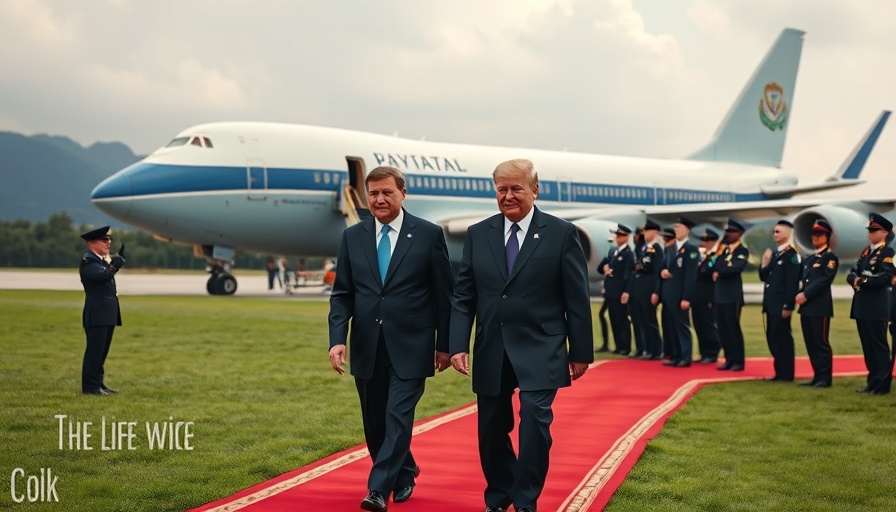
Putin Reclaims Spotlight on Global Stage
In a highly anticipated meeting at Joint Base Elmendorf-Richardson in Alaska, Russian President Vladimir Putin met with U.S. President Donald Trump, emerging from the summit with renewed stature on the world stage. This meeting, held on August 15, 2025, was seen as pivotal for international relations, especially considering the recent tensions surrounding the Ukraine conflict. The optics of Putin's visit, especially with Trump echoing Kremlin sentiments, have stirred conversations across political and diplomatic circles.
Trump's Position and its Implications
During the press conference following their discussions, Trump expressed his continuing interest in improved bilateral relations with Russia, a position that aligns closely with Putin's agenda. His comments suggested a softening of the U.S. stance toward Russia, which many analysts believe could embolden Putin in his regional ambitions, particularly concerning Ukraine. Observers argue that Trump's embrace of Kremlin viewpoints may complicate the already fraught dynamics of U.S.-Russia relations, raising concerns among international partners in Europe and beyond.
The Stakes in U.S.-Russia Relations
Putin’s return to the global spotlight is significant, especially as it comes against the backdrop of the ongoing war in Ukraine. Following the summit, experts from various global centers of power emphasize the risk of further geopolitical fragmentation if diplomatic channels remain obstructed. Trump’s rhetoric, which seemingly downplays the urgency of addressing Russian aggression, may undercut collective Western efforts to respond to challenges posed by Moscow.
Historical Context: A Repeating Pattern?
The dialogue between these two leaders is reminiscent of previous encounters between U.S. presidents and Russian leaders, where attempts to reset relations often led to frustrations for both sides. Historically, dialogues have oscillated between cooperation and confrontation, with Russia's ambitions being a key motivator of U.S. foreign policy shifts. As tensions rise, understanding the historical context of U.S.-Russia relations is crucial for anticipating future developments.
Future Predictions: Potential Scenarios
What does this mean for the future? Analysts predict several possible scenarios following the Alaska summit. One likely outcome could involve decreased sanctions pressure from the U.S. on Russia if Trump continues to push for closer ties. Conversely, European allies may react with skepticism and reinforce their defenses, sensing vulnerability in Western unity. The potential emergence of a more collaborative, yet equally strategic, framework means that while some tensions may ease, the undercurrents of rivalry will likely persist.
Counterarguments: Diverse Perspectives on Cooperation
Despite the optimism some American officials have regarding a thaw in relations, concerns persist about the implications of such cooperation. Critics argue that engaging with Russia without strict conditions could embolden its authoritarian tendencies. This perspective underscores the necessity for a balanced and critical view of U.S.-Russia engagements moving forward, recognizing not just the potential for dialogue, but the inherent risks this may impose on U.S. alliances worldwide.
Current Events: Why This Matters Now
Given the backdrop of the ongoing Ukraine conflict and a shifting geopolitical landscape, understanding the implications of this summit is paramount for global observers. The dynamics of power are shifting, and as both leaders navigate public and international sentiments, the narrative surrounding this meeting will undoubtedly shape future diplomatic interactions.
Actions and Insights from the Summit
The Alaska summit has provided several actionable insights for policymakers and analysts alike. Firstly, it illustrates the importance and fragility of diplomatic engagement; maintaining open lines of communication despite significant differences is key to mitigating risks. Secondly, the summit serves as a reminder of the domestic implications of foreign policy decisions in the U.S., particularly as upcoming elections place international relations in the spotlight.
In Conclusion: The Broader Picture
The Alaska summit has undoubtedly placed Putin back in the foreground of global diplomacy, with Trump signaling an era of potentially more accommodating U.S. foreign policy towards Russia. The complexities surrounding this relationship will continue to evolve, particularly as both leaders face domestic challenges and international scrutiny. Such historical moments not only draw attention to the personal dynamics of leadership but also compel a reflection on the broader implications for democratic values, international law, and global security.
For those interested in further discussions on international relations and political developments, don't hesitate to stay updated with the latest news and analyses, as this narrative continues to unfold.
 Add Row
Add Row  Add
Add 




Write A Comment